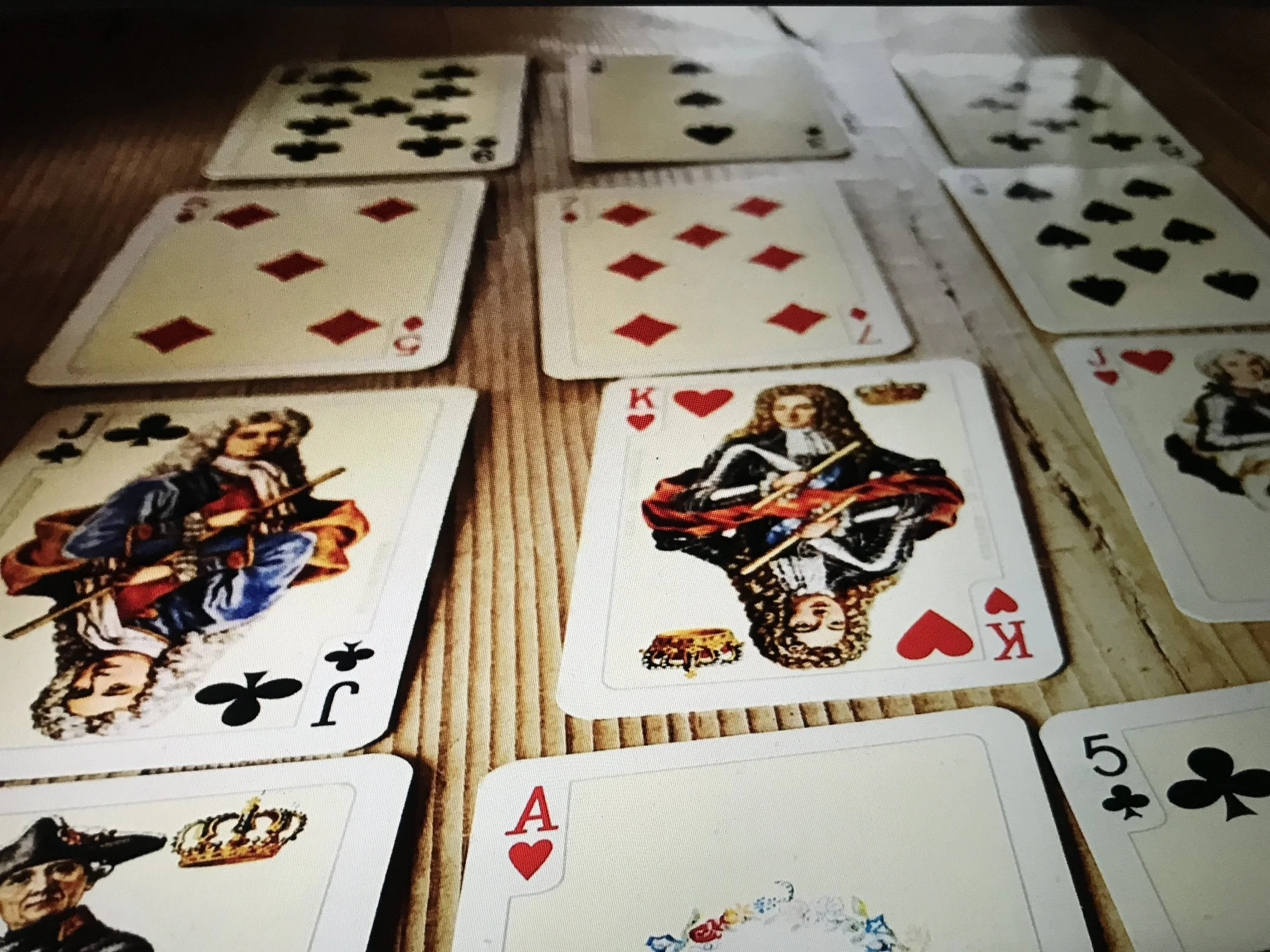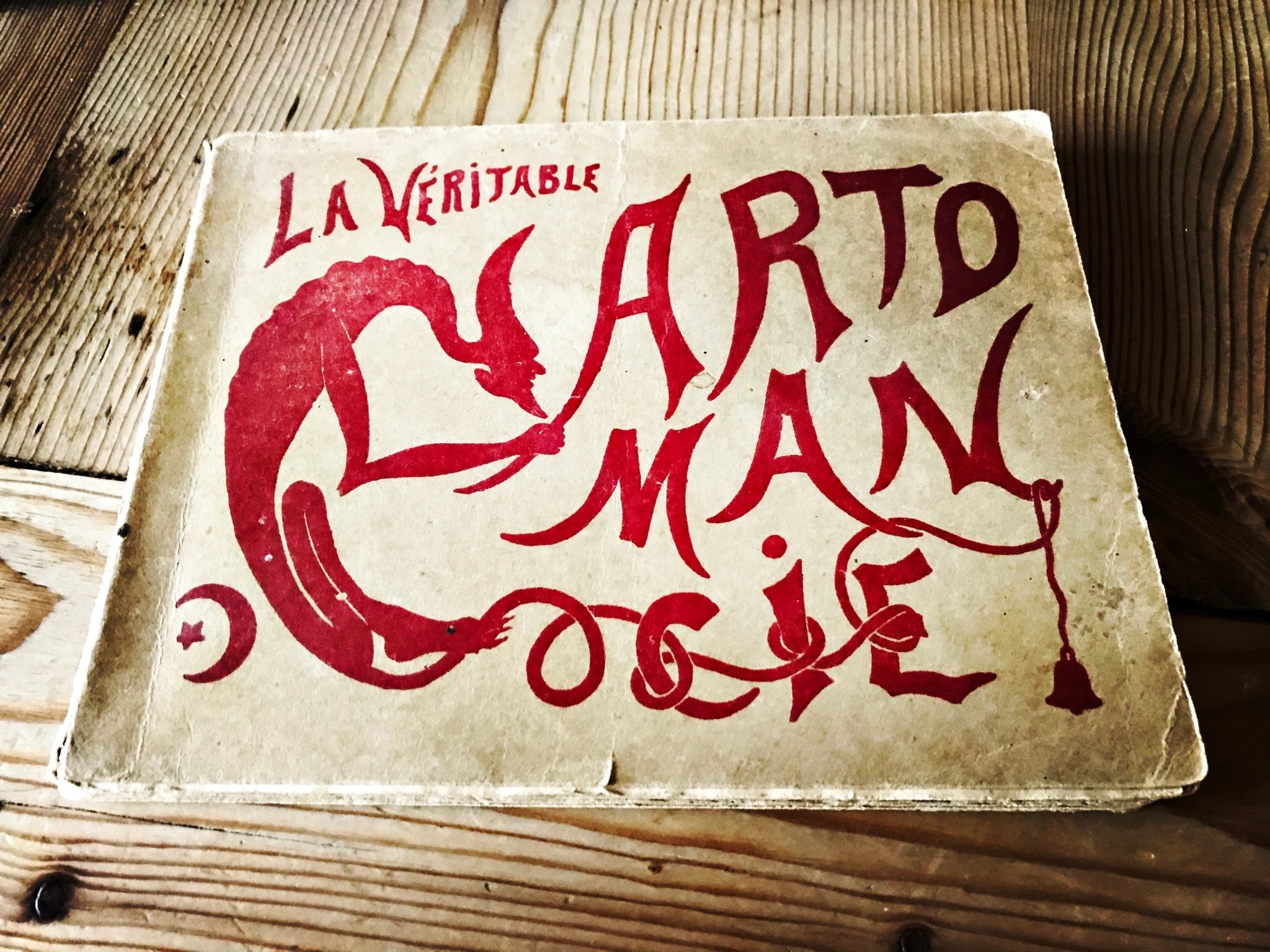The simplest lesson in cartomancy
There are many ways of reading cards, each more elaborate than the other. Also in this world there’s competition for it. Who can invent the most intense spread? The Americans like to do that. Count in chunks of fives or nines? The French like to do that.
I prefer the simple way, which is looking at the cards and understanding the essence of what I see as I see it, not as I think I know it.
I look at 9 Clubs, 3 Spades, and 8 Clubs.
I go like this:
Something 9 pieces of wood have an encounter with 3 shovels. Something 8 pieces of wood are still on the ground. I conclude: The shovels are not very efficient.
I look at 5 Diamonds, 7 Diamonds, 8 Spades.
I go like this:
Something 5 diamonds meets a greater fortune. Now there’s 7 of them. 8 shovels are at work. Man, someone is busy getting all them diamonds under the ground.
I look at Jack of Clubs, King of Hearts, Jack of Hearts.
I go like this:
Someone man of woods meets a father and his son, men of hearts. What’s cooking? Only the context can tell me what this encounter is about. I could invent things and call it ‘tradition’, but do I want to die from boredom? Fat chance.
Read like the Devil
Now you’re welcome to ask: Why do I prefer this method to all the other sophistications, meanings galore, and symbolisms stretched all the way to the moon?
The answer is simple: I have no interest in dying of boredom while performing any reading of the cards. Hearing myself on repeat and auto-pilot delivering the same old same old regardless of what context is put on my table is a sure way to hell or a place much worse.
Also, if there’s a strong stereotype out there representing the fortuneteller as a mean, cynical gypsy out to con you of your money, I can assure you that it’s because of said fortuneteller’s immense loathing of her job, when she has to deliver the same line at least 10 times a day. If I had to do that job, I’d also con people out of their money, not to mention the fact that I’d be close to suicidal. How would I live with myself repeating myself 10 times a day as if I were a goddamn omniscient god, going like this:
‘Yes, he’s cheating on you, the 7 Spades tells me, but it’s better to stay with him, as he’s a man of genius, the 3 Hearts also tells me. You’re, after all, most fortunate, as the 10 clubs tells me.’ (This is the French/Romanian Gypsy style reading where the clubs are the most auspicious and the spades are all about sex).
The thing is, one can divine with any method whatsoever, but are they all equally good? They aren’t. Not if nuance and fresh insight is what the fortuneteller is after. For this, you can try the simple method I’ve outlined here that will prevent you from loathing what you do and from loathing the people who come to you, asking almost always the same type of questions. Your answers don’t have to be equally uniform by the great book of veritable fortunetelling.
Great fortunetelling is all about the willingness to kill it, which is what you do when you read for the essence of what’s put on your table in the form of a question and its context. You take this essence and mirror it with the essence of the 4 cleverly stylized suits of a playing cards pack. You make a quick judgment that’s not based on regurgitating meanings à la ‘this means that…’ Your judgment must be the result of what you see is happening in the cards, with the sound conclusion based on what is plausible in context.
Let’s look at another example, where we have the King of Spades, the Ace of Hearts, and 5 Clubs on the table.
So this is the work. My work. I bet that if you’ve read this far, you may conclude now that whatever you feel about my teaching is actually irrelevant in the face of having to admit that you didn’t get bored. You’d probably like me to keep going. Which I can. I can tell the wildest stories with the cards, all tall and true. No cynicism, cross my heart. Only seeing what there’s to see.
†
Cards: Piatnik’s Playing Cards, 1954.
More lessons?
The third volume in the Read like the Devil trilogy is all about lessons. Simple lessons, yet of major impact. The book dedicated to reading with playing cards instructs in both method and technique, while offering insight of philosophical concern.








